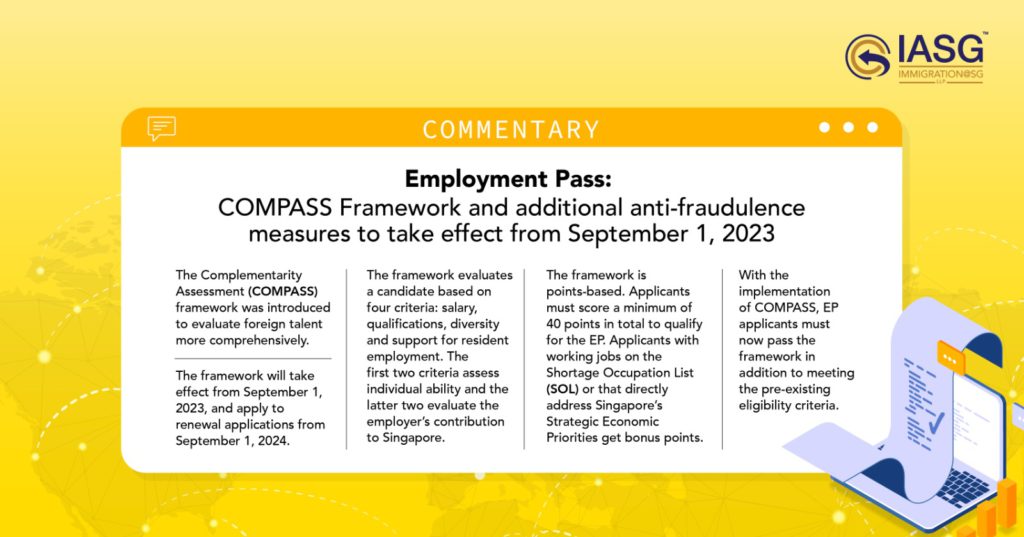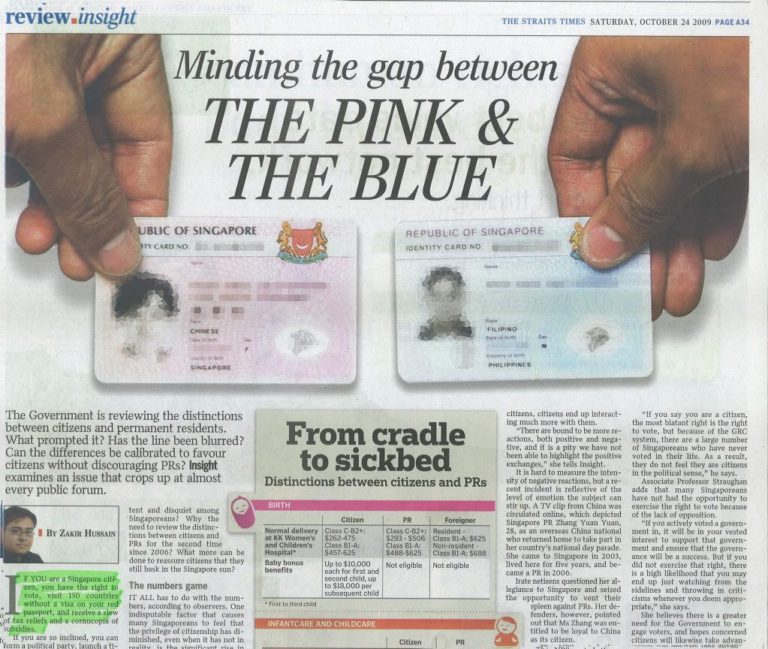Employment Pass: COMPASS Framework and additional anti-fraudulence measures to take effect from September 1, 2023.
New COMPASS Framework for Employment Pass Application
Starting from September 1st of this year, employers are required to submit verification proof of educational qualifications of new Employment Pass (EP) applicants. The new measure, announced by Manpower Minister Tan See Leng on Wednesday (March 1), is designed to prevent fraudulence.
COMPASS Framework
In conjunction with the new measure, the Ministry of Manpower (MOM) also released the Complementarity Assessment Framework (COMPASS). A points-based system aimed at evaluating foreign talent more comprehensively, it also takes effect in September, and will apply to renewal applications from Sept 1 2024 onwards.
Criteria and Attributes
COMPASS works by assessing a candidate’s individual and firm-related attributes. It evaluates each EP application by assigning a certain number of points (zero, 10 or 20) to each of the following criteria:
- Salary: relative to the salary norms of the professionals, managers, executives and technicians (PMETs) in the domestic workforce for the sector
- Qualification: based on the EP candidate’s qualification
- Diversity: whether the candidate improves nationality diversity in the firm
- Support for resident employment: the firm’s employment of resident PMETs as a percentage relative to industry peers
For Criterion 2 (qualifications), employers must submit additional proof to support any post-secondary educational qualifications declared in the application. Verification proofs should come from a background screening company approved by MOM and confirm the authenticity of qualifications submitted. These proofs do not include educational certificates certified by a notary public or school letters, as they are insufficient to prove authenticity. More information on verification requirements and background screening companies can be found here, and will be released by MOM over the next few months.
To pass COMPASS, an applicant must accumulate at least 40 points in total. Ideally, the candidate should score at least 10 points in each category. However, candidates who fall below expectations in one category but perform well in other categories can still score 40 points, and therefore qualify for EP. The image below shows how points are tabulated for every EP application.
Shortage Occupation List (SOL)
MOM has also introduced a Shortage Occupation List (SOL) under the COMPASS framework to prioritise individuals with niche and highly-specialised skills in short supply. Under the framework, such candidates will score extra points under two bonus categories: the Skills Bonus and Strategic Economic Priorities Bonus. In Singapore, specialised sectors in shortage include technology, healthcare and sustainability, which also face global talent shortages. The list will be refreshed every three years to keep abreast of industry developments.
Implications of the COMPASS Framework
The introduction of the COMPASS framework suggests a greater focus on recruiting high-quality candidates, evident from the points-based approach of the framework and the need to produce additional verification proof for educational qualifications. The former implies that candidates’ abilities are being benchmarked and evaluated more rigorously than before, while the latter is an anti-fraudulence measure.
The COMPASS framework also aims to address shortages in Singapore’s most critical sectors. Most jobs on the SOL are in the technology, sustainability and healthcare sectors. Technology and sustainability are nascent industries with high growth potential and the future vehicles of national development, necessitating new talent at every tier to help develop local talent, intellectual capital and infrastructure. Meanwhile, the local healthcare sector is chronically short on nurses and allied & psychological health practitioners, a problem exacerbated by Covid. The need for manpower in these areas is therefore acute—especially in nursing, a sector with high turnover rates. Compass specifically appeals to these professionals through the bonus points scheme, which increases their chances of obtaining an EP significantly.
The COMPASS framework features two firm-related considerations: diversity and support for local employment. Beyond their abilities, EP applicants must add to the firm’s cultural diversity, and their employer must have a strong track record of employing locals (citizens and permanent residents). As foundational criteria, they reflect a growing policy emphasis on social integration and local contribution. This is in line with the new narrative promoted by the Singapore government, which encourages foreign professionals to become more involved in the local community, such as through grassroots activities or participation in community events.
What Should Foreign Professionals Make of These Developments?
Taken together, the latest policy developments have made the EP application process more stringent. Candidates are highly encouraged to come prepared to prove their academic and professional qualifications.
Candidates with highly-niche, specialised skills stand the strongest chances of obtaining an EP. This is especially true for those working in jobs on the SOL, have extremely rare skills for their sector or are able to contribute directly to Singapore’s Strategic Economic Priorities. For candidates whose jobs are not listed on the SOL, this does not mean there is no hope for an EP approval. As immigration professionals, we recommend emphasising any unique skills or experiences that help their application stand out.
Conclusion on the New COMPASS Framework
Overall, the introduction of the COMPASS framework does not affect Singapore’s openness to immigration. Its goal is to foster greater confidence in foreign talent among the local workforce and push for greater diversity in the workplace. In tandem with local talent development, immigration remains the backbone of Singapore’s economic growth. Rather, the framework encourages candidates to more carefully consider how they can contribute to Singapore and its initiatives to groom its next generation of leaders, and which skills they can use to achieve those goals.







